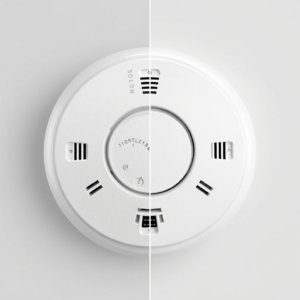
Choosing between ionization vs photoelectric smoke alarm technologies is one of the most important decisions when it comes to safeguarding your home. Different types of smoke detectors offer various advantages, but understanding how they operate and which circumstances they function best in is crucial to making the right selection. Whether you’re replacing old alarms or installing new ones, we’ve got you covered with a closer look at how these two technologies stack up.
What Are Ionization and Photoelectric Smoke Detectors?
Before we get into the pros and cons of each, it’s important to understand how these devices work.
- Ionization Smoke Detectors are highly responsive to fast-flaming fires. It uses a small amount of radioactive material between two charged plates. When smoke enters the chamber, the smoke interferes with ion flow and activates the alarm. Due to this property, ionization detectors have a high speed of operation for fires that flare up rapidly.
- Photoelectric Smoke Detectors, on the other hand, are designed to catch slow, smoldering fires. A light beam and a sensor are used in combination with the smoke particle interferences, which causes the scattered light to hit the sensor and activate the alarm. Such construction makes those kinds of detectors effective for fires that produce a lot of smoke but little flame.
Ionization vs Photoelectric Smoke Alarm: Pros and Cons of Ionization Detectors
Pros of Ionization Smoke Detectors
Responsive to Fast Flames
Ionization detectors target sudden, rapidly moving fires. These fire types can spread fast and, if not put out on time, can lead to widespread destruction. A grease fire in the kitchen is, for example, something that this detector can recognize faster than a photoelectric version.
Widely Available and Affordable
Ionization models are fairly common and inexpensive when compared to photoelectric detectors. Their price-scale has made them available to a home occupant who wants to save.
Compact Design
Because of their straightforward operation, ionization smoke detectors can be comparatively smaller and easier to install and can be used in areas where a larger device would be a shade too prominent.
Cons of Ionization Smoke Detectors
Prone to False Alarms
Homeowners typically feel aggravated with ionization detectors as one of the significant complaints surrounding them is the false alarms generated due to non-emergency situations. Cooking smoke or steam from a hot shower easily sets them off.
Less Effective for Smoldering Fires
Another weak point of ionization detectors is detecting slow fires. Fires in items such as furniture or carpets may not be detected in some situations that would be serious.
Radioactive Material
The radioactive substances employed in the ionization detectors are in small amount and safe for normal use, but some individuals simply prefer to avoid devices containing radioactive substances.
Pros and Cons of Photoelectric Smoke Detectors
Pros of Photoelectric Smoke Detectors
Effective for Smoldering Fires
Photoelectric detectors especially excel at the detection of fires that smolder slowly and produce great quantities of smoke. Fires resulting from electrical failures or the carelessly dropped cigarette butt are generally caught better by a photoelectric smoke detector.
Fewer False Alarms
Photoelectric models are less prone to being triggered by smoke or steam from cooking activities, unlike ionization detectors, they would be well-suited for placement close to kitchens or bathrooms.
Safer for the Environment
Photoelectric smoke alarms don’t use radioactive materials, which makes them environmentally friendly and preferable for those concerned about waste disposal.
Cons of Photoelectric Smoke Detectors
Slower Response to Fast Flames
The drawback, in general, is that photoelectric detectors are slower in reacting to very fast flaming fires. In the case of rapid fires, such as grease or paper fires, these alarms may fail to give adequate warning as fast as ionization models would.
Slightly Higher Costs
Upfront investment would seem to be more on the expensive side with photoelectric models. Not that the difference is drastic, but these factors can come to play for anyone purchasing multiple alarms for larger homes.
Potential for Sensor Obstruction
If dust or dirt has been allowed to accumulate on the light sensor, this will lessen the effectiveness of the detector. Therefore regular maintenance must be carried out.
Which One Should You Choose?
When comparing ionization vs photoelectric smoke alarm options, the best choice often comes down to your specific needs. For the most comprehensive protection, many safety experts recommend using a combination of both technologies or investing in dual-sensor smoke detectors. These devices integrate both ionization and photoelectric features, ensuring you’re covered for a wide range of fire types.
Previous